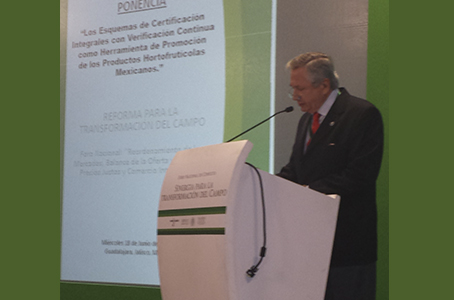Integral certification schemes with continuous verification as a promotional implement for Mexican horticultural products.

Mr. Heriberto Vlaminck Seidel, Chairman of the Eleven Rivers Board of Directors, participated in the National Forum for Market Reorganization, Balance of Supply and Demand, Fair Prices (Control Panel) and International Trade organized by ASERCA on 18 June 2014.
During his presentation, he commented among other things: “The Mexican Federal Government has done a very important overseas promotional work in the last decade and many producers have benefited from this great effort, thanks in part to these publicity campaigns, Mexican products have positioned themselves strongly in international markets.
However, the market is constantly changing and export challenges are becoming increasingly challenging for Mexican producers. The United States Modernization Law on food safety is one such challenge.
In recent years, accusations by the US Food and Drug Administration (FDA) about products of Mexican origin caused by outbreaks of contamination have impacted on the country’s economy due to damage in terms of sales and prices; Also affect the perception that the consumer public has about the food safety in the consumption of vegetables of Mexican origin.
Recent cases related to Mexico’s exports of tomato, chili, papaya, and cucumber are a clear example of the vulnerability of our sector to the suspicion of contamination in our products; But also makes clear as a reputation gained through more than 100 years as food exporters and through many resources invested in promotion, can be completed in a single day.
That is why, for today’s buyers, conventional certifications in safety are no longer a guarantee that a company is complying at all times with good agricultural practices and manufacturing, The main self-service chains and restaurants have implemented in recent years, verification programs to monitor the level of compliance of their suppliers that have already been certified; This way we can appreciate that the market trend is that the fruit and vegetable companies look for certification schemes that integrate verification programs to maintain a level of continuous compliance.
In addition to safety, current market trends mark other relevant issues; The changes in consumer behavior and their growing interest in acquiring sustainably produced food have been sponsoring structural changes in many horticultural companies in Mexico, especially those oriented to the export market.
To compete in the market today, quality and productivity are no longer sufficient. Today there is a need for a broad process of modernization and awareness that imposes on the fruit and vegetable companies of the country major challenges in safety and social and environmental responsibility; Challenges that can only be achieved through the implementation of certification schemes that allow full and continuous compliance.
In that sense, improving the capacity to meet higher quality standards has the potential to create new forms of competitive advantage and new promotion strategies to maintain or expand access to better market segments, both domestic and export, to Which is important to cultivate and maintain an image of confidence”.
At the end several proposals were presented along with the rest of the speakers at the discussion table, in the following bulletins we will announce the final results of the Forum.


